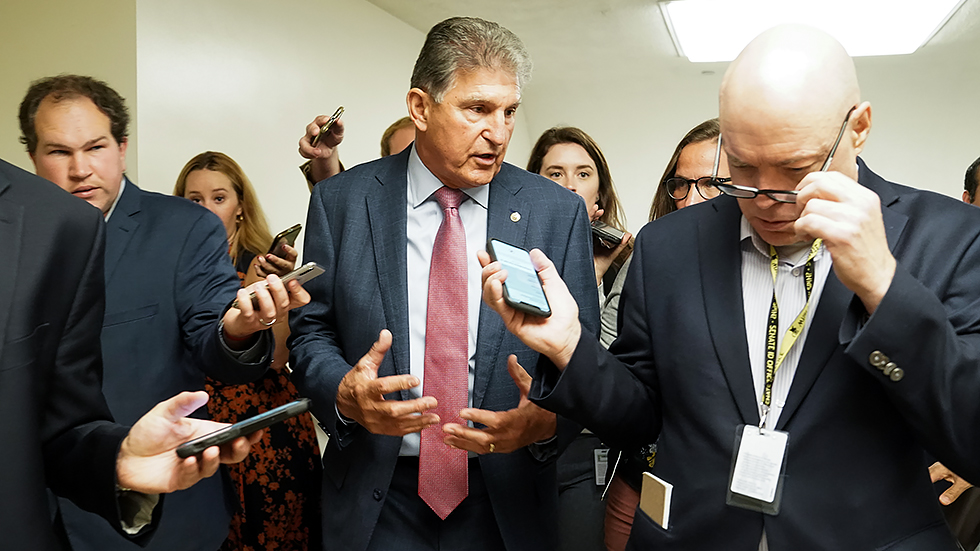Overnight Energy & Environment — Presented by Climate Power — Manchin: key energy provision of spending package ‘makes no sense’

Welcome to Monday’s Overnight Energy & Environment, your source for the latest news focused on energy, the environment and beyond. Subscribe here: digital-stage.thehill.com/newsletter-signup.
Today we’re looking at Joe Manchin’s opposition to a key environmental component of the Democrats’ reconciliation package, moderate House Democrats with their own reservations and a U.N. report with grim projections for the future of migration.
For The Hill, we’re Rachel Frazin and Zack Budryk. Write to us with tips: rfrazin@digital-stage.thehill.com and zbudryk@digital-stage.thehill.com. Follow us on Twitter: @RachelFrazin and @BudrykZack.
Let’s jump in.
Manchin opposes reconciliation clean energy program

Sen. Joe Manchin (D-W.Va.), a key vote in the 50-50 Senate, on Sunday signaled his opposition to both the $3.5 trillion price tag of the Democratic reconciliation package and a measure in it that would create a clean electricity payment program.
Manchin, the chair of the Senate Energy Committee, told CNN’s Dana Bash Sunday that a transition to clean electricity was already in process. “Now they’re wanting to pay companies to do what they’re already doing,” he said. “Makes no sense to me at all for us to take billions of dollars and pay utilities for what they’re going to do as the market transitions.”
The comments came shortly after Manchin called on fellow congressional Democrats to “hit the pause button” on the reconciliation package.
Under the $150 billion clean electricity payment program (CEPP), electricity providers would be required to increase the renewable energy distributed to consumers at a year-over-year rate of 4 percent. The program would financially penalize providers who fall short and provide grants to those who hit the goal.
Manchin’s opposition creates a major roadblock for one of President Biden’s top legislative priorities and a key part of his climate agenda. The White House has set a target of reducing America’s greenhouse gas emissions by half by 2030 and last week laid out a blueprint under which solar energy accounts for 40 percent of U.S. output by 2035.
Moderate Democrats raise concerns about spending bill’s energy measures
 Six moderate Democrats are raising concerns about the energy provisions put forth by their colleagues as part of a $3.5 trillion spending package.
Six moderate Democrats are raising concerns about the energy provisions put forth by their colleagues as part of a $3.5 trillion spending package. In a new letter to House leadership, Reps. Henry Cuellar, Vincente Gonzalez, Lizzie Fletcher, Sylvia Garcia, Marc Veasey, Filemon Vela and Colin Allred criticized policies from their colleagues that are “targeting the U.S. oil, natural gas, and refining industries.”
“We firmly believe that the budget reconciliation bill should not unduly disadvantage any industry, and oppose the targeting of U.S. oil, natural gas, and refining with increased taxes and fees and the exclusion of natural gas production from clean energy initiatives,” wrote the lawmakers, all of whom represent districts in Texas.
“These inequitable policies will cost American jobs, move America farther away from energy independence, and will slow the country’s move toward a lower carbon future,” they added.
The story so far: Their letter comes as Democrats hold slim majorities in both chambers and struggle to keep their coalition together in support of their spending proposal.
In the Senate, Democrats can’t have any defectors, while they hold an eight-vote majority in the House.
Recently, a group of nine lawmakers, including Cuellar, Gonzalez and Vela, expressed reservations about the two-track system for the bipartisan and Democrat-only spending bills.
Among proposals pushed by Democrats include a methane fee on pollution from the oil and gas industry and increased payments for drilling on public lands.
Read more about the letter here.
A MESSAGE FROM CLIMATE POWER
Climate change could spark migration of 216M people

Climate change could displace 216 million people by 2050 if issues like rising sea levels, water shortages and decreased crop productivity go unaddressed, a World Bank report titled Groundswell 2.0 warned on Monday.
The report found that climate migration “hotspots” could emerge by 2030 and cause serious strife in some of the world’s most poverty-stricken regions.
Sub-Saharan Africa alone could account for 86 million internal migrants. The report forecasts another 49 million to come from East Asia and the Pacific, while 40 million others could migrate within South Asia.
Such dramatic movement would have a major effect on both the places people are leaving and the locations where they are resettling.
For instance, Vietnamese migrants escaping high sea levels that disrupt rice production and fisheries in the Mekong Delta would likely flee to the central coast. But there, the Red River Delta faces its own climate crises such as severe storms.
Can anything be done?: However, the report adds that addressing climate change by restoring ecosystems and reducing development gaps could reduce the number of people forced to migrate.
“We have to reduce or cut our greenhouse gases to meet the Paris target, because those climate impacts are going to escalate and increase the scale of climate migration,” the World Bank’s lead environment specialist and Groundswell 2.0 co-author Kanta Kumari Rigaud said, according to Reuters.
Such actions could reduce the number of internal migrants to 44 million people, 80 percent less than the report’s status-quo scenario. However, the report does not include the Middle East, small island states, most high-income countries or other areas that could contribute to climate migration.
Read more about the report here:
WAYS TO GO
The House Ways and Means Committee’s portion of Democrats’ $3.5 trillion spending package includes increased tax incentives for clean energy and the creation of new tax credits for electric-vehicle owners, according to text released by Chairman Richard Neal (D-Mass.) late Friday night.
The committee’s portion would increase the production tax credit rate for wind and solar power to the full applicable rate through the end of 2031, which would then phase down to 80 percent in 2032 and 60 percent in 2033.
It would also increase the energy credit for solar energy facilities built in low-income communities, the rate of which would be based on a combination of health and economic benefits for those communities as well as job opportunities and engagement.
The Biden administration has made incentives for use of solar energy a major priority, announcing a roadmap last week in which it comprises 40 percent of U.S. electricity generated by 2035.
Read more about the committee’s package here:
WHAT WE’RE READING
- 3M’s support for PFAS could cost taxpayers billions of dollars, The Minneapolis Star-Tribune reports
- Why a Warming Arctic Has the U.S. Coast Guard Worried About the Rest of the Country, TIME reports
- Emails, docs show TVA’s ties to fight against federal regs, E&E News reports
- Record number of environmental activists murdered, BBC reports
FROM THE HILL’S OPINION PAGES: ”Australia’s duty to the world: Stop mining coal” by David Shearman of the University of Adelaide, South Australia
ICYMI
-
California grid limits may worsen inequitable access to solar energy: study
-
California freeway lanes reopen after forced closure from wildfire
-
Wildfire in Spain rages for fourth day
-
UN nuclear watchdog to travel to Iran for talks
And finally, something offbeat and off-beat: You don’t have to go home, but you can’t stay here.
A MESSAGE FROM CLIMATE POWER
That’s it for today, thanks for reading. Check out The Hill’s energy & environment page for the latest news and coverage. We’ll see you Tuesday.
{mosads}
Copyright 2023 Nexstar Media Inc. All rights reserved. This material may not be published, broadcast, rewritten, or redistributed. Regular the hill posts








